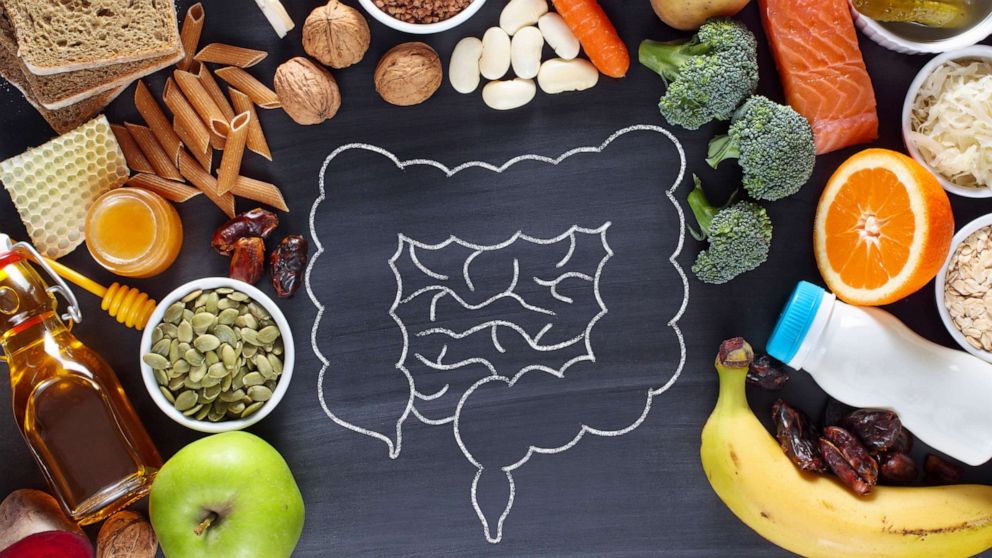Table of Contents
Exercise Daily – Recently, there has been a growing awareness of the importance of gut health and its impact on overall well-being. Your gut, also known as your gut microbiome, is home to trillions of bacteria that play a crucial role in your digestive and overall health. Maintaining a healthy gut can improve digestion, boost your immune system, and affect your mood. In this blog, we will explore the benefits of gut health and provide you with simple and delicious recipes that will help improve your gut health.
The health of our gut plays a crucial role in our overall well-being. From digestion to nutrient absorption, our gut health affects various aspects of our health, both physical and mental. Whether you’re experiencing digestive issues or want to boost your gut health, these recipes and some valuable insights from registered dietitians will set you on the right path.
Understanding Gut Health
What is Gut Health?
Gut health refers to the balance and overall well-being of the gastrointestinal tract. It involves the complex interaction between the gut microbiome, gut bacteria, and our body’s systems. A healthy gut is home to trillions of beneficial bacteria that aid in digestion, absorption of nutrients, and the maintenance of our overall health.
The Gut Microbiome
The gut microbiome is the collection of microorganisms, including bacteria, fungi, and viruses, that reside in our digestive system. These microorganisms play a crucial role in maintaining a healthy gut. The balance between beneficial and harmful bacteria in the gut microbiome is essential for optimal gut health.
The Importance of Gut Health
Maintaining a healthy gut is vital for several reasons. A healthy gut microbiome helps promote efficient digestion and nutrient absorption, strengthens the immune system, and supports mental well-being. A balanced gut can also reduce the risk of various health conditions, such as obesity, diabetes, and inflammatory bowel disease.

Signs of an Unhealthy Gut
Digestive Issues
One of the most common signs of an unhealthy gut is digestive problems. These may include bloating, gas, diarrhea, constipation, or irritable bowel syndrome (IBS). If you frequently experience these symptoms could indicate an imbalance in your gut bacteria or a compromised gut lining.
Weakened Immune System
A significant portion of our immune system resides in the gut. An unhealthy gut can weaken the immune response, making you more susceptible to infections, allergies, and autoimmune diseases.
Mood Disorders
Believe it or not, the health of your gut can influence your mood. The gut and brain are interconnected through the gut-brain axis. Imbalances in the gut microbiome can lead to anxiety, depression, and other mood disorders.
The Role of Probiotics and Prebiotics
Probiotics: The Friendly Bacteria
Probiotics are beneficial bacteria found in certain foods or taken as supplements. These bacteria help restore the balance of the gut microbiome by crowding out harmful bacteria and improving digestion. Foods rich in probiotics include yogurt, kefir, sauerkraut, and kimchi.
Prebiotics: Food for the Gut Bacteria
Prebiotics are dietary fiber that nourishes the beneficial bacteria in your gut. They serve as food for probiotics and promote their growth. Foods high in prebiotics include garlic, onions, bananas, oats, and asparagus.
Gut-Healthy Foods to Incorporate
Fermented Foods: The Probiotic Powerhouses
Fermented foods are a great way to boost your gut health as they are rich in probiotics. These foods undergo a fermentation process that promotes the growth of beneficial bacteria. Kimchi, sauerkraut, kombucha, and kefir are excellent examples of fermented foods that you can incorporate into your diet.
Whole Grains: Fiber for Gut Health
Including whole grains in your diet is essential for maintaining a healthy gut. Whole grains like brown rice, quinoa, and oats are fiber-rich, which acts as a prebiotic and supports the growth of beneficial gut bacteria. Fiber also helps regulate bowel movements and prevent constipation.
Plant-Based Foods: Nourish Your Gut
A plant-based diet is known to promote gut health. Fruits, vegetables, legumes, and nuts are packed with essential nutrients and are excellent sources of fiber. These foods provide antioxidants, vitamins, and minerals that nourish your gut and support overall health.

Recipes for Gut Health
Gut-Boosting Breakfast: Chia Seed Pudding
Ingredients:
- Two tablespoons chia seeds
- 1 cup unsweetened almond milk
- One tablespoon of honey or maple syrup
- Fresh berries for topping
Instructions:
- In a bowl, combine chia seeds and almond milk. Stir well.
- Add honey or maple syrup for sweetness and mix thoroughly.
- Cover the bowl and refrigerate overnight or for at least 4 hours.
- Stir it well once the chia seeds have absorbed the liquid and formed a pudding-like consistency.
- Serve the chia seed pudding in a bowl and top it with fresh berries.
Gut-Healing Lunch: Kimchi Brown Rice Bowl
Ingredients:
- 1 cup cooked brown rice
- 1/2 cup kimchi
- 1/2 cup cooked chickpeas
- 1/2 cup steamed broccoli
- 1/4 cup shredded carrots
- 2 tablespoons soy sauce or tamari
- 1 tablespoon sesame oil
- Sesame seeds for garnish
Instructions:
- Combine brown rice, kimchi, chickpeas, steamed broccoli, and shredded carrots in a bowl.
- Whisk together soy sauce or tamari and sesame oil in a separate bowl.
- Pour the sauce over the rice bowl and toss to coat everything evenly.
- Sprinkle with sesame seeds for garnish.
Gut-Nourishing Dinner: Tempeh Stir-Fry
Ingredients:
- 1 package of tempeh, cubed
- 2 tablespoons tamari or soy sauce
- 2 tablespoons sesame oil
- 1 tablespoon maple syrup or honey
- 2 cloves garlic, minced
- 1 cup mixed vegetables (bell peppers, broccoli, carrots)
- Cooked brown rice or quinoa for serving
Instructions:
- Whisk together tamari or soy sauce, sesame oil, maple syrup or honey, and minced garlic in a bowl.
- Add the cubed tempeh to the bowl and let it marinate for 15-20 minutes.
- Heat a skillet over medium heat and add the marinated tempeh and marinade.
- Cook for 5-7 minutes, until the tempeh is browned and crispy.
- Add the mixed vegetables to the skillet and stir-fry for 5 minutes.
- Serve the tempeh stir-fry over cooked brown rice or quinoa.
Gut-Friendly Snack: Greek Yogurt with Berries
Ingredients:
- 1 cup Greek yogurt
- Assorted fresh berries (strawberries, blueberries, raspberries)
- Honey or maple syrup for drizzling
Instructions:
- Spoon Greek yogurt into a bowl.
- Top with a generous amount of fresh berries.
- Drizzle with honey or maple syrup for added sweetness.
- Enjoy as a tasty and gut-friendly snack.

FAQs – The Benefits of Gut Health and Simple Recipes to Improve Yours
Q: Can gut health impact your overall health?
A: Absolutely! Gut health plays a vital role in overall health. A healthy gut ensures efficient digestion, absorption of nutrients, and a robust immune response. It also influences mental well-being and may reduce the risk of various health conditions.
Q: What is the gut microbiome, and why is it important?
A: The gut microbiome is the collection of microorganisms in our digestive system. It includes bacteria, fungi, and viruses. The gut microbiome is essential as it supports digestion, nutrient absorption, immune function, and even brain health.
Q: How can I improve the diversity of bacteria in my gut?
A: To improve the diversity of bacteria in your gut, focus on consuming various plant-based foods, including fruits, vegetables, legumes, and whole grains. These foods provide a wide range of fibers and nutrients, nourishing different gut bacteria.
Q: Are probiotic supplements necessary for a healthy gut?
A: While probiotic supplements can benefit specific individuals, they are unnecessary for everyone to maintain a healthy gut. A balanced diet that includes probiotic-rich foods can often provide sufficient beneficial bacteria.
If you’re considering probiotic supplements, it’s best to consult with a healthcare professional or registered dietitian who can assess your specific needs and recommend the most suitable options.
Q: How does gut health affect digestion and nutrient absorption?
A: A healthy gut is essential for proper digestion and nutrient absorption. The gut microbiome helps break down complex carbohydrates, fiber, and certain fats that our bodies cannot digest independently. The beneficial bacteria in the gut produce enzymes that aid digestion of these compounds.
Conclusion
Prioritizing your gut health is crucial for overall well-being. Understanding the importance of gut health, recognizing signs of an unhealthy gut, and incorporating gut-healthy foods into your diet can support a healthy gut microbiome and improve digestion, nutrient absorption, and immune function.
Remember to focus on consuming probiotic-rich foods like fermented foods, incorporate prebiotic fibers through fruits, vegetables, and whole grains, and maintain a balanced diet that nourishes your gut and supports overall health.
With the provided recipes and insights, you can start your journey towards better gut health and enjoy the numerous benefits it brings to your well-being.






